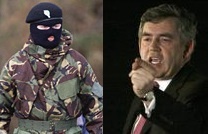
The British government has rejected any idea of engagement with militant republican groups.
The Direct Rule ‘Security’ minister Paul Goggins was responding to an appeal by former Ardoyne parish priest Fr Aidan Troy.
He said that there is “a political process in Northern Ireland” and that “those who believe in democracy have joined it”.
Fr Troy had suggested dialogue with the IRA factions could “prevent future loss of life” following deadly attacks last week which left two British soldiers and a member of the PSNI dead.
“There isn’t going to be any appeasement in this approach but if it saves one other grieving family, and even if people were to pour scorn on me today, I don’t mind that,” he said.
However, Fr Troy said he would not “take on” the British government.
“If that’s the view of a British minister then so be it. I just hope he’s right.”
Nevertheless, he stood by his proposal to find someone who could “make an engagement” with the armed groups while being sensitive to the families of those bereaved in the recent attacks.
Sinn Fein has backed the British approach, with party president Gerry Adams insisting that the armed groups should not be given “room to breathe”.
After a meeting with the 26 County Taoiseach, Brian Cowen, Mr Adams said “no one should support them, give succour to them, join them or work with them”.
The entire political establishment is maintaining a firm line on its approach to the militants, insisting the groups have no support and categorising the attacks as a final, desperate act.
The 26 Counties Minister for Justice, Dermot Ahern, said the “dissidents” had an “absolutely tiny” presence in the South.
PSNI Chief Hugh Orde led the British media campaign with a series of television and newspaper interviews to play down the threat.
He admitted that in the past 18 months or so there have been at least 25 attacks on the British Crown forces, but that the PSNI was now being helped by members of the British military intelligence (MI5) and by ‘elite’ intelligence troops, the infamous Special Reconnaissance Regiment.
“We must put this into perspective. These groups are small in number,” he said. “The Real and Continuity IRA are disrupted, infiltrated and disorganised. The current wisdom is that they number around 300 in a population of 1.75 million.”
However, a senior PSNI officer in the Derry area said that the ‘Real IRA’ is on a recruitment drive in the city.
“The reality is they are out there in the communities, working, trying to recruit people, trying to pervert people, trying to turn people to their cause and that’s very worrying.”
Armed patrols have been set up across the border by the 26-County Garda police, while checkpoints manned by armed PSNI units are being continued in the North.
Surveillance and other intelligence-gathering operations have also been significantly increased in a reported escalation of covert operations against the breakaway groups.
A conscious effort was being made “not to overreact and create an oppressive security regime”, according to officials.
But plans for another British military parade through Belfast have been halted, it has been confirmed. Last October, a parade by the Royal Irish Regiment controversially went ahead in Belfast city centre despite major protests by nationalists and despite fears of a potential armed attack.
TEEN INTERROGATED
Meanwhile, a teenager who was the first to be arrested following the attacks remains under interrogation at Antrim PSNI base, along with ten others, including prominent Lurgan republican Colin ‘Collie’ Duffy.
Former Sinn Fein councillor Brendan McConville and republican activists Dominic Og McGlinchey and his brother, Declan McGlinchey have also been arrested and are being held without charge.
Some of those held have now been interrogated for almost two weeks and can be questioned for up to 28 days under new special powers adopted by the British state.
Mike Ritchie, director of the Committee on the Administration of Justice, said he was concerned about the length of their detention period.
“We would be concerned about holding anyone for this length of time and the fact that one of them is a minor is an additional concern that aggravates the situation,” he said.
He said that while there was no evidence yet that the teenager’s human rights had been breached, there were concerns that such detentions would become the norm.
“It is during moments like now when there is universal revulsion that it is important the authorities keep to the elements of the Good Friday Agreement that emphasise human rights.
“This is the precise time when we need to be most vigilant.”
![[Irish Republican News]](https://republican-news.org/graphics/title_gifs/rn.gif)
![[Irish Republican News]](https://republican-news.org/graphics/title_gifs/harp.gif)

